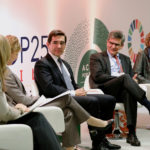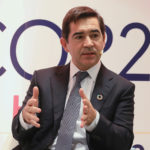Carlos Torres Vila (BBVA): “Sustainability is a core part of our strategy”
Climate change is “probably the greatest business disruption humankind has ever faced,” BBVA Group executive chairman Carlos Torres Vila said at the Madrid Climate Change Conference. That’s why “sustainability is a core part of our strategy. The future of finance lies in financing the future,” he stressed.

“At BBVA, we have taken a comprehensive approach to sustainability challenges by including not only climate change, but also other environmental and social challenges in our strategy,” explained Carlos Torres Vila. The bank’s Pledge 2025 is part of this strategy, and is based on three pillars: 1) mobilizing resources in green financing, sustainable infrastructure, social entrepreneurship and financial inclusion; 2) managing environmental and social risks in order to minimize the bank’s potential negative impacts, both direct and indirect; and 3) engaging with all stakeholder groups to collectively promote greater contribution to sustainable development from the financial industry.
“At BBVA, we have taken a comprehensive approach to sustainability challenges by including not only climate change, but also other environmental and social challenges in our strategy”
Pledge 2025 includes the goal of mobilizing €100 billion in sustainable finance between 2018 and 2025. BBVA’s Group executive chairman stressed that the bank is advancing at a faster than expected pace - by nearly 20 percent. He therefore opened to door to updating this target.
At COP24, BBVA was also one of the first five banks in the world (along with BNP Paribas, ING, Société Générale and Standard Chartered) to announce in Katowice (COP24) its commitment to progressively align its lending business with the Paris Agreement.

BBVA’s Group executive chairman Carlos Torres Vila during his participation at COP25 in Madrid.
BBVA puts an internal price on CO2 emissions
BBVA’s Group executive chairman announced that from now on, the bank will put an internal price on its CO2 emissions, thus incorporating this factor into its decision-making processes. This “incentivizes each area” to plan for the CO2 cost of each of their actions, and encourages lower emissions. All of this will contribute to the goal of being carbon neutral in 2020, which he also announced today.
In February 2018, the bank committed to ensure than 70 percent of the energy consumed by the group around the world will come from renewable sources by 2025, and reach 100 percent in 2030, while reducing CO2 emissions by 68 percent in 10 years.
These steps will help attain the emission reduction targets set in the Paris Agreement, which BBVA has committed to meet. These initiatives are also in line with the European Commission’s Green Deal, which foresees a “climate neutral” European Union in 2050.
The bank aims to be carbon neutral in 2020, Carlos Torres Vila announced
In line with its purpose - to bring the age of opportunity to everyone - BBVA’s Group executive chairman underscored that a fundamental part of its strategy includes “providing clients advice to improve their financial health, and helping them in their transition to a more sustainable economy.” This includes offering a unique range products, and in this regard, the bank plans to offer a sustainable alternative for all of its products in Spain in 2020.
Carlos Torres Vila also emphasized the importance of ensuring global coordination between the public and private sectors on a global level, as well as developing a common taxonomy that defines what is considered a sustainable activity. In this respect, he indicated that the lack of definitions “should not be an excuse to start action now. Financial institutions are catalysts for this change”, and “we need to move forward quickly.”
Also participating in the event were Nadia Calviño, the Acting Minister of the Economy and Business; Margarita Delgado, the Deputy Governor of the Bank of Spain; Inger Andersen, the Executive Director of UNEP; and Santander CEO, José Antonio Álvarez.